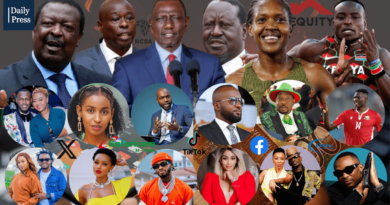Rigathi Gachagua Rakes in Over Sh4 Million from TikTok Livestream Gifts
Former Deputy President Rigathi Gachagua has made headlines once again—this time not for political maneuvering, but for reaping massive financial rewards through a TikTok livestream. On June 27, during a live broadcast where he criticized President William Ruto’s government, Gachagua received an overwhelming show of support from viewers in the form of TikTok’s premium virtual gifts.
The livestream earned him 78 “lions,” each valued at approximately KSh 51,800, totaling over KSh 4.04 million. After TikTok’s 50% commission, Gachagua is estimated to have pocketed a net amount of around KSh 2.02 million.
During the livestream, Gachagua spoke passionately about what he termed as the failures of the Ruto administration, echoing sentiments he has recently voiced in public appearances. He called on disillusioned Kenyans to rally behind him and support the youth-led movement that has been challenging the current government’s legitimacy.
In a move that appeared both strategic and symbolic, he urged supporters to send him “lions” on TikTok—widely recognized as the platform’s highest-value gift.
The gesture did not go unnoticed. Social media exploded with commentary, with many users expressing shock and amusement at the size of the donations. Some questioned the authenticity of the contributions, speculating whether they were genuine gifts from supporters or part of a coordinated campaign to boost his online presence and project popularity.
“Why would Kenyans send a politician money? Especially one who has already held power?” one user wrote on X (formerly Twitter). Others speculated the funds could have come from Gachagua’s own networks through multiple accounts to simulate popular support.
This livestream marks a significant shift in how political figures are leveraging digital platforms. While Kenyan politicians have long used social media to engage supporters, Gachagua appears to be the first to turn these interactions into direct financial gain using TikTok’s monetization tools. The development raises new questions about transparency, regulation, and the intersection of politics and influencer-style online engagement.
Although Gachagua has not publicly addressed the amount he earned or responded to speculation about the legitimacy of the donations, the event underscores a growing trend in political communication—where personality, digital savvy, and monetization are becoming deeply intertwined.
Experts suggest that if this model proves successful, more politicians might turn to platforms like TikTok not only to shape narratives but also to raise funds, especially as Kenya heads toward the 2027 general elections.
Analysts have pointed out that such developments could attract scrutiny from regulatory bodies like the Kenya Revenue Authority (KRA), particularly if large sums of money are being exchanged on social platforms without clear oversight. Additionally, questions are likely to emerge around campaign financing rules and whether such digital earnings might require formal disclosure in future elections.
In a political season already marked by economic frustration, mass protests, and leadership uncertainty, Gachagua’s TikTok windfall adds another surprising chapter.
Whether this moment will redefine political campaigning or remain a flash-in-the-pan event remains to be seen. What is clear, however, is that Kenya’s political landscape is evolving fast—and digital platforms are now at the center of both influence and income.



